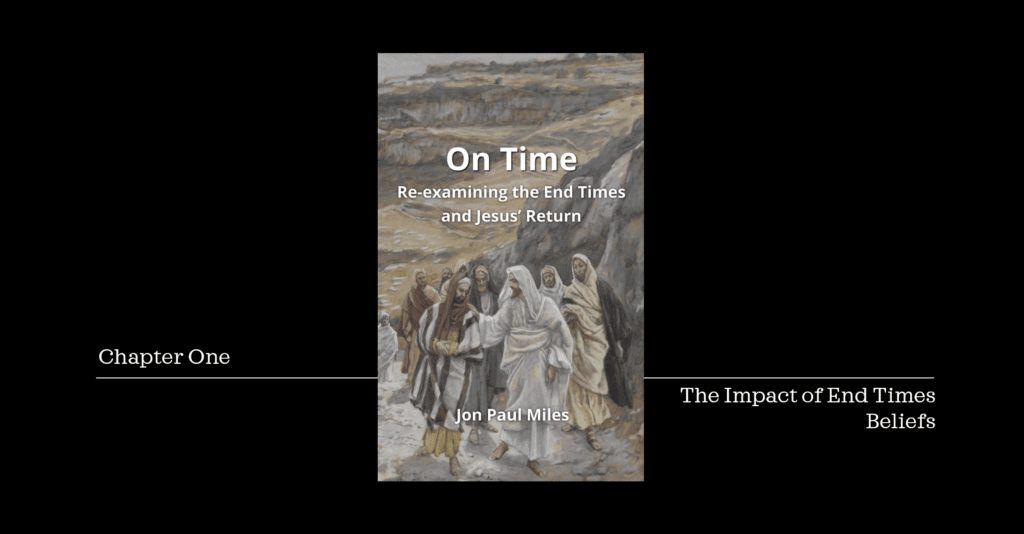Guest Article by Jon Paul Miles – The Impact of End Times Beliefs
My good friend, Jon Paul Miles, is releasing the chapters of excellent his book, On Time: Re-examining the End Times and Jesus’ Return, in article form. I hope the reader will enjoy chapter one here.
To purchase the book, go to: https://www.amazon.com/Time-Re-examining-Times-Jesus-Return-ebook/dp/B0BYJ7G1B5
For Jon Paul’s original post, go to: https://revelationsingrace.netlify.app/articles/the-impact-of-end-times-beliefs?fbclid=IwAR3MmjFk3id4cGrWOBcyGSJTyYUpzrKqS5sa6mnDKBhPbI4THa_Pv_mhSkA
Chapter 1 – The Impact of End Times Beliefs
By Jon Paul Miles
June 16, 2023
3 min read
Many Christians today hold the belief that they are living in the end times, drawing interpretations from current events and biblical prophecies (Pew Research Center, 2022). This perspective often leads to a pessimistic outlook, anticipating a future filled with disasters, wars, and the rise of an antichrist figure (Harold Eberly, Victorious Eschatology). However, this belief in an imminent end can sometimes result in irrational decisions and neglect of long-term goals.
For instance, there have been individuals who, expecting the Great Tribulation in their lifetime, have made drastic decisions. One man chose to uproot his life, moving from the city to the wilderness, in an attempt to live off the land and prepare for survival. Similarly, a mother refused to properly homeschool her children during the Covid lockdowns, convinced that the rapture could occur at any moment. In other cases, the fear of impending events has even influenced choices regarding starting a family, with some individuals abandoning the idea of having children due to concerns about their future well-being. These examples demonstrate the impact of the belief in an imminent end on people’s everyday lives and decision-making processes.
Moreover, a Pew Research study found that those who believe the end times will come in their lifetime were less likely to apply to college or have high-income levels. This highlights how such beliefs can shape individuals’ priorities, potentially leading to a disregard for long-term goals and aspirations.
What if there is an alternative way to understand the end times? What if the end times were not about the end of the world but rather the end of the Old Covenant Age? How might our plans and perspectives change if we believed that Jesus has already returned, judged the dead, and established the Kingdom of Heaven on earth?
This possibility may initially seem outlandish, but it is worth considering Jesus’ clear promise of his return and the end of the age within his own generation. Matthew 24, Luke 21, and Mark 13 contain Jesus’ famous end-time prophecies, often referred to as the Olivet Discourse, which include references to the Great Tribulation, the fall of the Jewish temple, signs in heaven and on earth, and Jesus’ return on the clouds for judgment.
Matthew 24:34 (New International Version) Truly I tell you, this generation will certainly not pass away until all these things have happened.
Some skeptics, including renowned author and scholar C. S. Lewis, have pointed out the potential embarrassment of Jesus’ promise to return within his generation (Lewis, World’s Last Night, 97-98). However, various interpretations have been proposed to reconcile this timeframe, such as considering “this generation” to refer to a future generation, interpreting “generation” as “race,” or suggesting that only some of the prophecies would happen in that generation while the rest are in our future. Some believe that Jesus deliberately gave a false expectation of imminence to motivate believers to be always prepared for his arrival, while others suggest that Jesus was simply guessing about the timing of his prophecies.
However, there is another possibility that is often overlooked: the idea that Jesus promised to return in his generation and did return on time. By examining historical events surrounding the fall of the Jewish temple in 70 AD, including accounts of angelic armies seen flying on the clouds and other remarkable occurrences, there is evidence that aligns with the fulfillment of Jesus’ prophecies. Additionally, the persecution of Christians under Nero, the eruption of Mount Vesuvius, and other significant events during that time period provide further context.
Surprisingly, this view is not a new one. Many early church fathers, including Eusebius in 325 AD, interpreted these first-century events as a partial fulfillment of Jesus’ prophecies in Matthew 24.
Adopting this alternative understanding of the end times does raise challenges, particularly when it comes to reconciling the promises of Revelation, such as the elimination of death, pain, and suffering. However, by carefully examining scripture and comparing different passages, it is possible to seek answers to these pressing questions.
Questioning and exploring our beliefs about the end times can lead to a deeper understanding and a more hopeful outlook. Through prayerful study and remaining open to the guidance of the Holy Spirit, one can find clarity, confidence, and peace in their journey. While this exploration may be both exciting and challenging, it is important to press on with prayerful courage.



